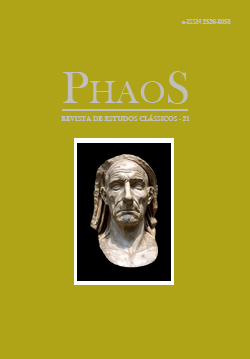Abstract
This article’s goal is to point out textual evidence of the aemulatio of Virgil’s Aeneid in Camões’ Os Lusíadas, as well as to suggest an indication of the importance of this procedure to the Portughese epic’s meaning. The analysis of some passages that allude to the Aeneid has allowed to identify certain lexical, morphological, syntactic, structural, and figurative tools used by Camões in order to build an “amplification rhetoric” which enhances the adventure narrated by him in opposition to that narrated by Virgil. It has also allowed to conclude that the meaning achieved through the emulation, at least as indicated by the analyzed passages, is the framing of an apotheosizing image of the Lusitanian and their divinely guided mission, which are superior even to the mythical hero Aeneas and the foundation of Rome itself told in the Aeneid. Therefore, the exaltation of the “barões assinalados” depends on the competitive allusion to the Aeneid, because in this way they end up unmatched in History.
References
ANDRÉ, C. A. Eneida e Os Lusíadas. In: SILVA, V. M. A. e. (Org.). Dicionário de Luís de Camões. São Paulo: Leya, 2011. p. 337-341.
CAMÕES, L. V. de. Os Lusíadas. Edição: Emanuel Paulo Ramos. Porto: Porto Editora, 1980.
CIDADE, H. Luís de Camões: o épico. 2. ed. Lisboa: Livraria Bertrand, 1953.
CONINGTON, J. Vergili Maronis Opera [comentários]. London: Oxford University Press, 1863. Vol. 2.
CONTE, G. B. Memoria dei poeti e sistema letterario. Torino: Giulio Einaudi, 1974.
DIAS, E. Os Lusíadas [comentários]. 3. ed. Rio de Janeiro: Ministério da Educação e da Cultura, 1972.
DIAS, F. B. [Sem título]. In: CAMÕES, L. de. Os Lusíadas. Edição fac-similar. Coimbra: Almedina; Colégio das Artes da Universidade de Coimbra, 2016. p. 7-9.
DIONÍSIO DE HALICARNASSO. Tratado da imitação. Tradução e comentários: Raul Miguel Rosado Fernandes. Lisboa: INIC, 1986.
DIONYSIVS HALICARNASSVS. Dionysii Halicarnassensis Librorum de Imitatione. Texto grego: Hermann Usener. Bonn: 1899.
GREENE, T. M. The Light in Troy: imitation and discovery in Renaissance Poetry. Yale University Press, 1982.
HANSEN, J. A. Notas sobre o gênero épico. In: TEIXEIRA, I. (Org.). Multiclássicos Épicos. São Paulo: EDUSP, 2008. p. 17-91.
IAVOL (Índice Analítico do Vocabulário de Os Lusíadas). Volume B: A-I. Organização: A. G. Cunha. Guanabara: Instituto Nacional do Livro, 1966b.
IAVOL (Índice Analítico do Vocabulário de Os Lusíadas). Volume C: J-Z. Organização: A. G. Cunha. Guanabara: Instituto Nacional do Livro, 1966a.
LONGINO. Do sublime. Tradução e comentários: Maria Isabel de Oliveira Várzeas. Coimbra; São Paulo: Imprensa da Universidade de Coimbra; Annablume, 2015.
LONGINUS. On the sublime. Texto grego e tradução: W. Rhys Roberts. 2. ed. Cambridge: Cambridge University Press, 1907.
OLIVA NETO, J. A. Breve anatomia de um clássico. In: VIRGÍLIO. Eneida. Tradução: Carlos Alberto Nunes. 2. ed. São Paulo: 34, 2016. p. 9-65.
PASQUALI, G. Arte Alusiva. Tradução: Alexandre Piccolo e Lucy Ana de Bem. In: PRATA, P.; VASCONCELLOS, P. S. de. (Org.). Sobre intertextualidade na literatura latina: textos fundamentais. São Paulo: Editora Unifesp, 2019. p. 11-21.
RODRIGUES, J. M. Fontes dos Lusíadas. 2. ed. Lisboa: Atlântida Editora, 1979.
RUSSELL, D. A. De imitatione. In: WEST, D.; WOODMAN, T. (Org.). Creative imitation and Latin literature. Londres: Cambridge University Press, 1979. p. 1-16.
THAMOS, M. As armas e o varão: leitura e tradução do Canto I da Eneida. São Paulo: Edusp, 2011.
VASCONCELLOS, P. S. Efeitos intertextuais na Eneida de Virgílio. São Paulo: Humanitas; FAPESP, 2001.
VIEIRA, Y. F. Mitologia, alegoria e discurso: observações sobre o “discurso alusivo” de Camões. Revista Camoniana, São Paulo, v. 3, n. 2, 1980, p. 189-206.
VIRGÍLIO. Eneida. Comentários: João Angelo Oliva Neto. Tradução: Carlos Alberto Nunes [edição bilíngue]. 2. ed. São Paulo: Editora 34, 2016.

This work is licensed under a Creative Commons Attribution-NonCommercial-ShareAlike 4.0 International License.
Copyright (c) 2022 Phaos: Revista de Estudos Clássicos


